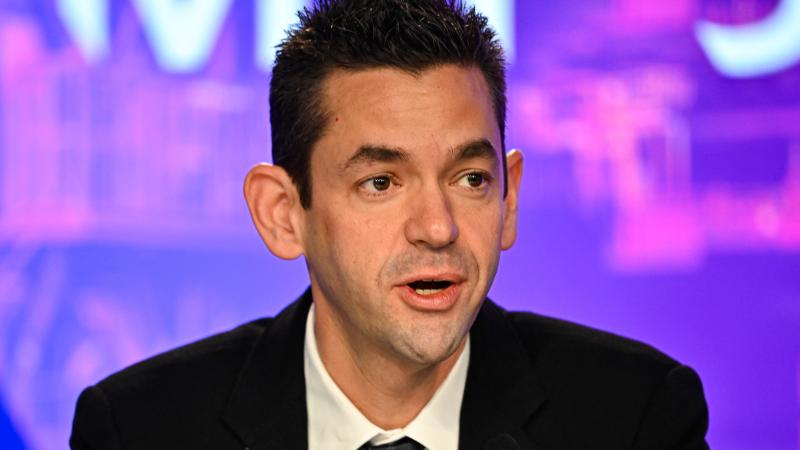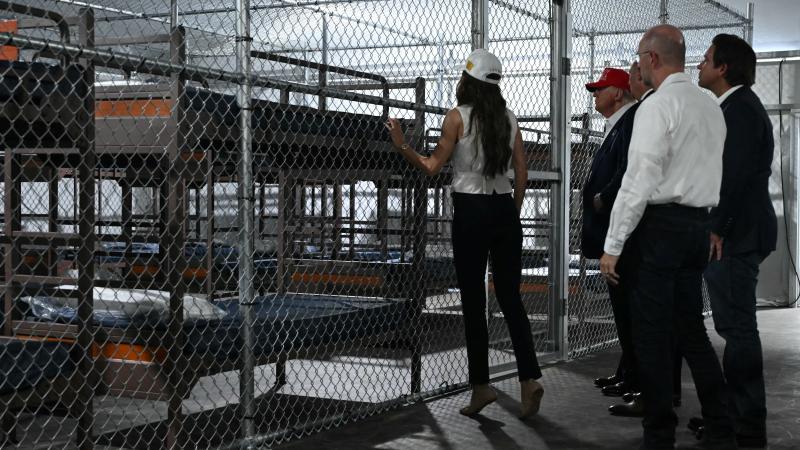Biden Bailout Fallout: VA budget bungling led to Veterans Affairs crisis last year
Internal watchdog finds that VA received money out money it didn’t need, and Congress paid.
President Joe Biden's dramatic emergency request to bail out the VA last year was rooted in massive bureaucratic bungling and resulted in Congress appropriating money that was not needed, the agency’s internal watchdog concluded.
The Biden administration faced several self-inflicted accounting problems at the U.S. Department of Veterans Affairs on the eve of the new admin, leading to emergency spending requests, one of which exceeded actual needs and raising the ire of Congress.
The inspector general report published Thursday confirms that a $2.9 billion supplemental request went unused because the agency failed to account for “prior-year recoveries” in its budget planning. Had the agency taken into account those recovered funds, the inspector general found, its projections “would have shown a reduced risk of a shortfall by year-end.”
The emergency funding requests last summer threatened that budget shortfalls would endanger benefits to veterans, specifically in the department that handles educational and financial benefits. To that end, the agency requested a $2.9 billion supplemental budget appropriation to cover the estimated shortfalls to prevent any interruption to benefits.
Ultimately unnecessary
House Republicans passed a supplemental funding bill to meet the agency’s request, but required the then-VA Secretary Denis McDonough to review the agency’s accounting practices to prevent unprojected shortfalls from recurring. The VA later admitted to the House Committee on Veterans’ Affairs that the $2.9 billion budget request was ultimately unnecessary, drawing sharp criticism from the panel’s chairman, who blamed the Biden administration for “mishandling” the agency’s budget.
The OIG review team found that Veteran’s Benefits Administration wasn’t consistently overspending in FY 2024 for either compensation and pension or readjustment benefits accounts, which were the subject of the budget request. “Realized prior-year recoveries,” which are “unspent deobligated funds,” weren’t included in the agency’s calculations, which contributed to the erroneous predictions.
“Had the realized prior-year recoveries been included in the calculations throughout the year, the monthly funding status reports would have shown a reduced risk of a shortfall by the end of the fiscal year,” the watchdog concluded.
You can read the IG's report below:
The Trump Administration VA Secretary said the emergency budget request was akin to a type of political extortion, putting pressure on Congress as the government approached a shutdown. He also promised that under his leadership the agency would strive to properly manage its budget.
"Look, this was, frankly, came down to more or less a political--I would just almost call it an extortion--toward the end of last year, because it came out between the time of the hearings and the appropriation process, at the end of the year, you know, run up to a shutdown," Secretary Doug Collins told the "Just the News, No Noise" TV show on Thursday.
"It's just a very, a department that is so bureaucratically bogged down that it has trouble doing its main mission, and that is taking care of veterans, and that's why we're actually working very hard to streamline processes, to get better help in place, and to have budgets and numbers that we can be accurate," Collins said.
Bost: "Budget accounting mess"
House Committee on Veterans’ Affairs Chairman Mike Bost, R-Ill., said on Thursday that the watchdog’s conclusions confirm his concerns about how the Biden administration mismanaged the budget for the agency responsible for funding medical care and other assistance for veterans of the U.S. armed forces across the country.
“Today my team received a briefing from the VA Inspector General on the Biden administration’s budget accounting mess last year that spread fear among veterans and their families that their benefits were in jeopardy. Unfortunately, the Inspector General confirmed today what we always feared, that it appears that senior Biden VA officials repeatedly misled Congress on the reality of the situation. This is incredibly concerning given that President Biden urged Congress to provide billions of additional taxpayer dollars to account for something that never even existed,” House Committee on Veterans’ Affairs Chairman Mike Bost, R-Ill., said in a statement.
Biden-era VA officials said that their emergency request relied on an assessment of risk and was meant to serve as a warning for a worst case scenario.
“Out of an abundance of caution last fiscal year, VA requested additional benefits funding — because if we were even $1 short on funding, critical benefits for 7 million veterans and survivors would have been delayed,” then-VA spokesman Terrence Hayes told the Washington Examiner last November. “Those veterans and survivors rely on those monthly payments, and any delay could have been devastating for them and their families — and that was not a risk that we were willing to take.”
Bost nearly accused agency officials of misleading Congress in their testimony.
Previous testimony under the lens
“Troublingly, it suggests that Under Secretary for Benefits Joshua Jacobs, Under Secretary for Health Shereef Elnahal, and their chief financial officers repeatedly misinformed Congress and our nation's veterans, even risking inciting a panic among veterans about their benefits being delayed or cut,” Bost wrote to then-Secretary McDonough on Nov. 1, 2024. “We question who directed them to do this. Their utter inability to forecast and determine costs accurately erodes Congress' faith in VA.”
The inspector general also questioned the congressional testimony of Under Secretary Jacobs about the projected budget shortfall. The under secretary had told Congress that “any funding shortfall of just $1 would prevent VA from processing its September pay file,” and that the agency would not be able to meet any of its obligations on time.
“However, the OIG found that improved financial management practices would have reduced the risk of a reported shortfall and the need for a supplemental funding request,” the watchdog concluded.
Chairman Bost said the Inspector General’s conclusions show that the incident warrants further probes by his committee “to get answers for veterans and taxpayers.”
“I will not shy away from compulsory action to ensure that those who may have misled Congress are held accountable for their actions including reviewing possible perjury by VA officials for lying to Congress,” Bost vowed.
Secretary Collins promised that the agency would be responsive and truthful with Congress during his tenure at the helm.
"I promised the Senate, when I was confirmed that I would never send a witness to the Hill that did not have proper answers," Collins said. "I keep my word. And folks, I'm keeping my word to the veterans. We're going to spend your money wisely, and we're going to do it on veterans getting the healthcare they need and the benefits they've earned."















